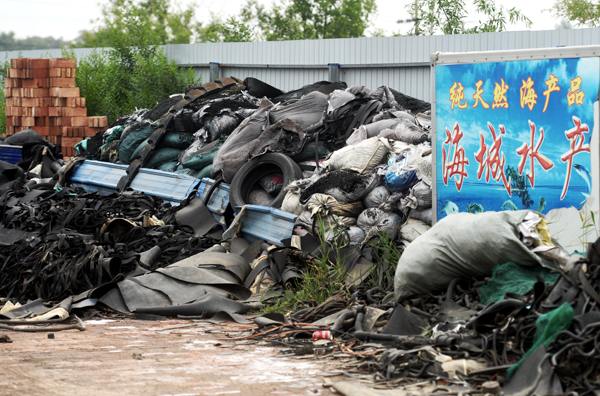Crackdown launched to get rid of 'toxic tracks'
Ministry acts after reports that synthetic surfaces are making children ill nationwide
China's top education authorities are cracking down on so-called toxic running tracks on campuses nationwide to protect students' health, the Ministry of Education said on its website on Thursday.
"Any existing synthetic running tracks on campuses that are recognized by environmental protection and quality inspection departments as failing to meet quality standards will be removed immediately," the ministry said.
It said it will work with other government departments to investigate newly renovated tracks during the summer vacation and suspend all the ongoing or planned construction of tracks at schools.
Synthetic running tracks have been to allegedly have made students ill at schools in a number of provinces and cities since last year, attracting widespread public attention.
Problems have been found in raw materials, production, contract bidding, installation and supervision.
Several government departments, including education, housing, environmental protection and quality inspection, have been involved in joint efforts to find solutions.
The Ministry of Education said the safety of students and their health is its top priority. It said it has paid great attention to the incidents since they were first reported last year and has conducted inspections, drafted regulations and revised standards.
The ministry said it will continue to cooperate with other departments to fix the problems to ensure that the tracks at schools meet standards.
Zhang Yinping, director of a Tsinghua University center that carries out tests on building environments, said the existing standards make no stipulation on monitoring or assessing air quality on the running tracks after construction or when renovation is completed, especially on hot, wet summer days.
"Experimental models should be set up to estimate the density of polluted air above the tracks in different weather conditions," Zhang said.
"In addition, monitoring is also necessary during use to avoid new pollution.
"The best way to solve all these problems is to use pollution-free materials and additives when installing the tracks."
The Ministry of Education said it will support schools in different areas in making construction plans for sports fields based on their geographical, climatic and financial situations.
"Synthetic running tracks will not be the only choice in the future," the ministry said.
On Thursday, authorities in Hebei province said that people working in small private enterprises in the province involved in producing running tracks that do not meet standards had been detained and an investigation is underway.
Sun Xiaochen contributed to this story.
Procedures,standards vary overseas
Japan:
Primary and middle schools, and even universities in Japan use sand and soil running tracks. These are made of a compressed mixture of at least three types of sand and soil, which are believed to be natural and safe and to have benefits such as elasticity and porousness to drain water.
South Korea:
Only 24 percent of the country's primary and middle schools use synthetic running tracks. The government ordered an overall investigation of all school running tracks from March to June, and any that didn't meet standards were to be replaced by more environmentally friendly ones.
The United Kingdom:
School running tracks must be certified by inspectors as being of good quality and condition before they may be used.
The United States:
Most schools in the US use rubber and plastic running tracks, and any procedure or data concerning the bidding for building running tracks at school must be open to the public.
zhaoxinying@chinadaily.com.cn
|
 Used tires lie discarded on the grounds of a rubber plant in Cangzhou, Hebei province, on Wednesday. Some small rubber plants in Hebei were exposed by media for making substandard running tracks with industrial waste like used tires. Provided To China Daily |
























